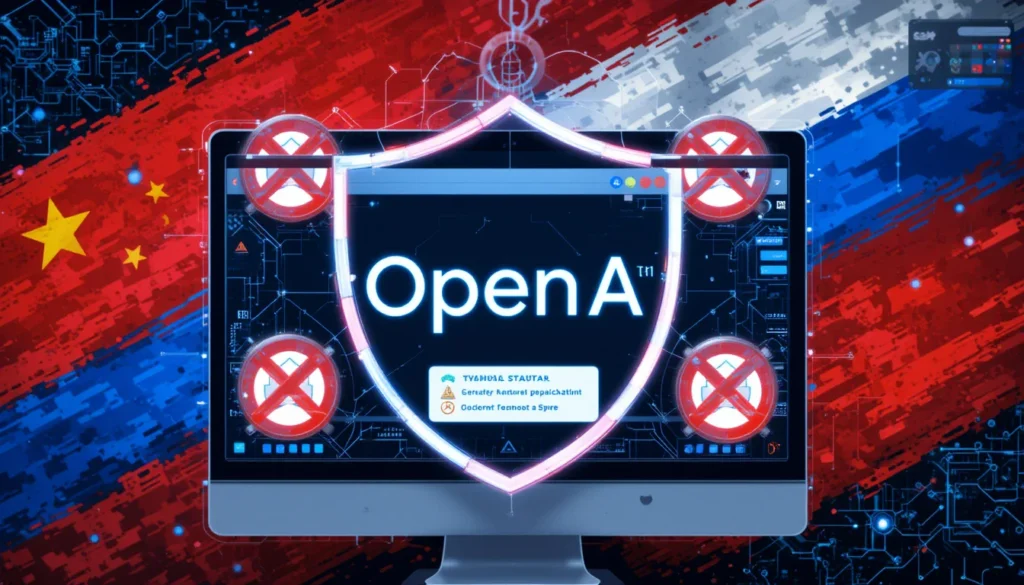Overview
In a bold and unprecedented cybersecurity action, OpenAI blocks Russian and Chinese threat actors from using ChatGPT, citing misuse of its AI tools for cyber-espionage, disinformation campaigns, and malicious operations. This move underscores rising global concerns over the abuse of generative AI by hostile nation-state groups.
Key Facts
- OpenAI collaborated with Microsoft Threat Intelligence to identify malicious accounts.
- Russian and Chinese state-linked actors used ChatGPT for phishing, scripting malware, and influence operations.
- Groups like Storm-0539 (Russia) and Charcoal Typhoon (China) were implicated.
- Tools like ChatGPT were used to translate documents, debug code, and create convincing phishing content.
- OpenAI has terminated accounts linked to five major threat groups.
- This is the first public disclosure of state-backed abuse of ChatGPT.
- OpenAI is increasing transparency and enhancing monitoring mechanisms.
What’s Verified and What’s Still Unclear
Verified:
- OpenAI identified misuse of ChatGPT by five state-affiliated threat actors.
- Actors used AI for research, translation, social engineering, and basic scripting.
- Affected groups include known APTs like Storm-0539 (Russia) and Charcoal Typhoon (China).
Unclear:
- The full extent of information exfiltrated or operations aided by ChatGPT.
- Whether similar actors in other countries are exploiting AI tools undetected.
- How often these groups accessed and utilized OpenAI services before detection.
Timeline of Events
- Early 2024: Microsoft begins investigating suspicious activities linked to APT groups.
- May 2024: OpenAI joins Microsoft in threat intel analysis.
- June 2024: Multiple accounts tied to foreign threat actors are discovered.
- Mid-June 2024: OpenAI terminates and publicly discloses the takedown of these accounts.
- June 21, 2024: Announcement gains international attention as a landmark AI security development.
Who’s Behind It?
- Storm-0539: A Russian group involved in credential theft and phishing targeting defense and government sectors.
- Charcoal Typhoon: A Chinese threat group known for cyber-espionage against academic institutions and think tanks.
- Crimson Sandstorm: Iranian-affiliated group misusing ChatGPT for generating malware and decoys.
- Emerald Sleet: North Korean group attempting to write appealing emails and cyber lures using ChatGPT.
These actors were not exploiting ChatGPT for zero-day generation or sophisticated malware, but for enhancing operational efficiency, content generation, and social engineering.
Public & Industry Response
The cybersecurity community has praised OpenAI’s transparency. Major platforms, including Microsoft, emphasized that collaboration between tech companies is key to defeating AI-enabled threats.
Cybersecurity analysts and privacy advocates have called this a “wakeup call” regarding AI governance and ethical usage enforcement. However, some critics warn that state actors may migrate to less regulated AI models or open-source tools.
What Makes This Attack Unique?
This incident marks the first documented use of ChatGPT by multiple nation-state APT groups across Russia, China, Iran, and North Korea. Unlike traditional attacks, these adversaries didn’t exploit software vulnerabilities — they manipulated generative AI to enhance credibility, speed, and reach in disinformation and cyber campaigns.
Additionally, it exposes a new class of cyber risk: the misuse of AI assistants for crafting emotionally persuasive and contextually accurate phishing messages.
Understanding the Basics
How Can ChatGPT Be Abused by Threat Actors?
Threat actors can leverage ChatGPT to:
- Write grammatically correct phishing emails.
- Translate sensitive data or intelligence into local languages.
- Generate fake news headlines or narratives for influence campaigns.
- Debug basic Python or PowerShell malware scripts.
- Simulate conversation to test social engineering techniques.
These actions, while seemingly low-skill, amplify threat capabilities when performed at scale and combined with human operators.
What Happens Next?
- Stricter Verification: OpenAI may implement stronger identity checks and API usage monitoring.
- Shared Intelligence: Tech companies may increasingly pool threat intelligence on AI misuse.
- AI Policy Push: Governments might accelerate AI regulation to prevent unchecked use by hostile entities.
- Rise in Decentralized AI Abuse: Bad actors may shift to open-source AI models that lack restrictions.
- Cyber Norms Debate: This case could push the UN and international bodies to set rules around AI in cyber warfare.
Summary
OpenAI blocks Russian and Chinese threat actors from using ChatGPT, revealing how generative AI is fast becoming a new battlefield in global cyber warfare. The disclosure highlights the dual-edged nature of AI — its benefits for productivity and its risks for national security.
As AI adoption grows, transparency, cooperation, and regulation will be key to preventing misuse. OpenAI’s move sets a critical precedent, but the global cybersecurity community must stay vigilant, adapt rapidly, and ensure these powerful tools serve humanity — not harm it.
